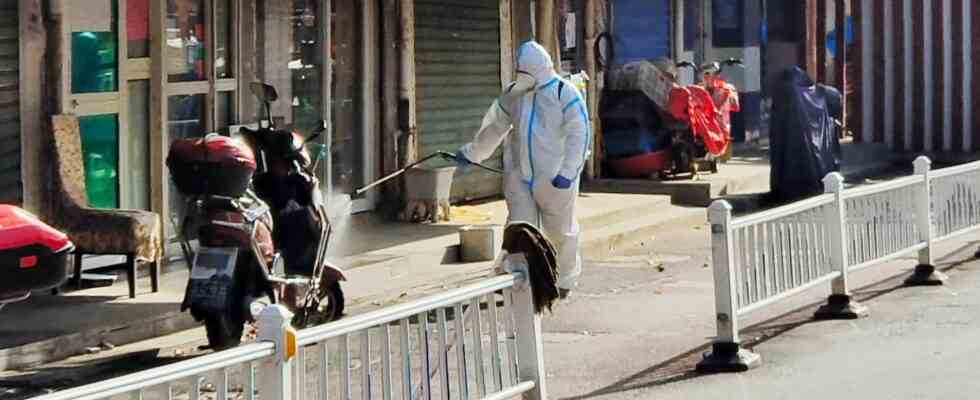With old weapons, China is fighting a new enemy: Omikron BA.2. Curfews, mass testing and quarantine are becoming less effective. Millions of people have been stuck in their apartments in Shanghai for weeks. The supply is bad. Desperation grows.
Mr. Yu wants to see a doctor and has a slight fever. “I have nothing to eat. I feel terrible,” the elderly gentleman said in an urgent phone call to his neighborhood committee in Shanghai. For weeks, most of the 26 million inhabitants of the port metropolis have been subject to a tough and often chaotic lockdown. He is also out of medication, Mr. Yu complains. His request for medical treatment or for computer tomography has remained unanswered for days by a higher authority. “Is it okay with you if I die?”
Lockdown in Shanghai creates chaos
The official at the other end of the line is overwhelmed: “We are powerless and can’t do anything about it,” he says and complains about those responsible. “They don’t do anything for the elderly, the pregnant women and the elderly who have died. They don’t even take care of the garbage cans.” A recording of the conversation, apparently recorded by a family member, goes online, outraging millions until censorship removes it.
“I can’t believe what has become of our country,” says Mr. Yu resignedly at the end. The representative of the neighborhood committee agrees: “I don’t know why Shanghai has changed so much either.” The talk struck a chord, with even China’s state media calling it a “sad story” but insisting Mr Yu was eventually taken to the hospital for treatment.
Although the city has not yet reported any Covid deaths, desperate reports from relatives are circulating on the Internet that the elderly or chronically ill have not received medical treatment and have died as a result.
Biggest corona wave since the beginning of the pandemic
Ironically, the economic and financial center, the pride of China, slides into chaos. The richest city is at the center of the largest corona wave that the most populous country on earth has experienced since the outbreak of the pandemic two years ago.
Lockdowns also apply in the metropolises of Changchun and Shenyang, the province of Jilin in north-east China and in apartment blocks in other cities such as Beijing. Many millions of people are affected nationwide – in Shanghai also several thousand Germans. You can’t just leave. On the one hand there are hardly any flights, on the other hand they don’t even come to the airport.
As the rest of the world tries to “live with the virus,” China’s authorities are fighting a new enemy with old weapons: Omicron BA.2. The rapidly spreading variant challenges China’s zero-Covid strategy. Rigorous methods such as curfews, mass tests and quarantine are becoming less effective – so far they have not been able to stop the virus in Shanghai. The majority of the 30,000 new infections per day nationwide are discovered in the port city.
Logistical nightmare
“The current lockdown and its logistical nightmare is the final nail in the coffin for Shanghai’s attractiveness to the rest of the world,” says Vice President of the European Chamber of Commerce in China, Bettina Schön-Behanzin, who has lived in the port city for a long time. “It’s really not typical of Shanghai that there was actually a lack of preparation before these prevention and control measures are implemented.”
Grocery delivery works poorly. Residents who don’t have enough supplies shout out of windows: “We’re hungry.” Officials admit problems with the supply “in the last hundred meters”. “There are four of us in my family, and if we only had to rely on the government’s vegetable distribution, we definitely wouldn’t have enough,” said Ms. Ye, a 26-year-old financial expert in Xuhui District, who has been in her for a month Apartment stuck.

Similarly, a woman in the Pudong district: “I’ve been isolated at home for 30 days and finally got vegetables from the authorities.” Before that she had only received rice, flour and oil once. She lives on supplies and was lucky to catch something on the Internet, which millions of Shanghainese find difficult. “Shanghai is usually pretty good, but the government is doing far too little,” says the young woman. “Me and my friends want to leave Shanghai.”
There is a fear of being quarantined if one of the constant tests turns out to be positive. Every infected person in China has to go to central warehouses, which have also been set up in exhibition halls for tens of thousands. Often there are no showers. There are complaints about dirty toilets. “These are super-spreader isolation sites, and it’s very easy to get cross-infections,” warns the EU Chamber Vice-President Schön-Behanzin.
The nerves are raw. State media admit that “doubt, fear and fatigue are palpable”. Residents insult white-faced pandemic folders or police officers who also take violent action against protesting residents, as videos on the Internet show. Residential areas are monitored from the air with drones. High barriers and site fences hermetically seal off houses. Robot dogs with blaring megaphones strapped to them run through empty streets: “Wear a mask, wash your hands frequently and measure fever!” It will probably go on like this for weeks. The outbreak in Shanghai should not really be under control until mid-June, say Chinese experts.

